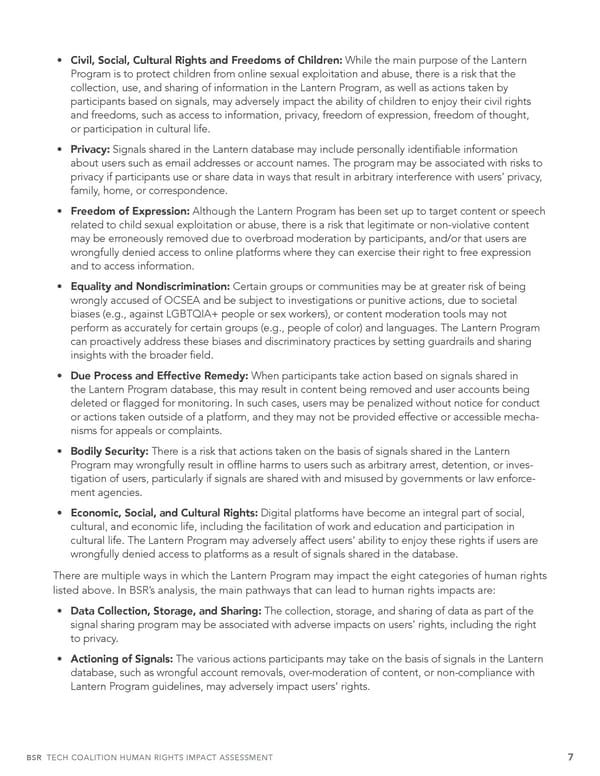• Civil, Social, Cultural Rights and Freedoms of Children: While the main purpose of the Lantern Program is to protect children from online sexual exploitation and abuse, there is a risk that the collection, use, and sharing of information in the Lantern Program, as well as actions taken by participants based on signals, may adversely impact the ability of children to enjoy their civil rights and freedoms, such as access to information, privacy, freedom of expression, freedom of thought, or participation in cultural life. • Privacy: Signals shared in the Lantern database may include personally identi昀椀able information about users such as email addresses or account names. The program may be associated with risks to privacy if participants use or share data in ways that result in arbitrary interference with users’ privacy, family, home, or correspondence. • Freedom of Expression: Although the Lantern Program has been set up to target content or speech related to child sexual exploitation or abuse, there is a risk that legitimate or non-violative content may be erroneously removed due to overbroad moderation by participants, and/or that users are wrongfully denied access to online platforms where they can exercise their right to free expression and to access information. • Equality and Nondiscrimination: Certain groups or communities may be at greater risk of being wrongly accused of OCSEA and be subject to investigations or punitive actions, due to societal biases (e.g., against LGBTQIA+ people or sex workers), or content moderation tools may not perform as accurately for certain groups (e.g., people of color) and languages. The Lantern Program can proactively address these biases and discriminatory practices by setting guardrails and sharing insights with the broader 昀椀eld. • Due Process and Effective Remedy: When participants take action based on signals shared in the Lantern Program database, this may result in content being removed and user accounts being deleted or 昀氀agged for monitoring. In such cases, users may be penalized without notice for conduct or actions taken outside of a platform, and they may not be provided effective or accessible mecha- nisms for appeals or complaints. • Bodily Security: There is a risk that actions taken on the basis of signals shared in the Lantern Program may wrongfully result in of昀氀ine harms to users such as arbitrary arrest, detention, or inves- tigation of users, particularly if signals are shared with and misused by governments or law enforce- ment agencies. • Economic, Social, and Cultural Rights: Digital platforms have become an integral part of social, cultural, and economic life, including the facilitation of work and education and participation in cultural life. The Lantern Program may adversely affect users’ ability to enjoy these rights if users are wrongfully denied access to platforms as a result of signals shared in the database. There are multiple ways in which the Lantern Program may impact the eight categories of human rights listed above. In BSR’s analysis, the main pathways that can lead to human rights impacts are: • Data Collection, Storage, and Sharing: The collection, storage, and sharing of data as part of the signal sharing program may be associated with adverse impacts on users’ rights, including the right to privacy. • Actioning of Signals: The various actions participants may take on the basis of signals in the Lantern database, such as wrongful account removals, over-moderation of content, or non-compliance with Lantern Program guidelines, may adversely impact users’ rights. BSR TECH COALITION HUMAN RIGHTS IMPACT ASSESSMENT 7
 Tech Coalition Human Rights Impact Assessment of the Lantern Program Page 6 Page 8
Tech Coalition Human Rights Impact Assessment of the Lantern Program Page 6 Page 8